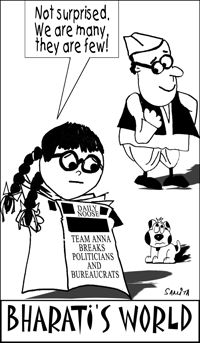An unavoidable reality of the massive government school system (1.26 million Central, state and local government primary-secondaries with an aggregate start-of-the-academic year enrolment of 220 million students) are the myriad money-making rackets — teacher recruitment and transfers, construction and equipment supply kickbacks — and perhaps the most lucrative of them all, textbooks printing contracts.
Typically, contracts for printing millions of textbooks (mostly in vernacular languages) are farmed out to ill-qualified printers at inflated prices in return for kickbacks. Moreover, ill-qualified teachers are contracted to write them after which they are forced upon captive teachers and students in government schools.
This is the explanation behind the slipshod textbooks published under the imprint of the Karnataka Textbook Society (KTS) and distributed free of charge to the 5.7 million children enroled in Karnataka’s 46,000 government primary schools. This year the class VI history textbook in the chapter on Gol Gumbaz, Bijapur — the mausoleum of Muhammad Adil Shah who ruled Bijapur during 1626-1656 AD — provides erroneous information that a unique feature of the mausoleum’s Whispering Gallery is that “sounds made in the gallery echo seven times”.
This incorrect information printed in the class VI textbook has prompted anti-socials to transform the historic Whispering Gallery into a high decibel noise pollution zone. “It’s true that the Gol Gumbaz echoes but there’s no basis for stating that it magnifies sound seven times,” says S.V.P. Halkatti, superin-tending archaeologist, Archaeology Survey of India (ASI, Dharward circle) adding that ASI is now mulling a ban on entry of visitors into the Whispering Gallery.
 Nor is this textbook blunder an exception. The prescribed class I geography text mixes up the Mandya and Gulbarga districts; a class VIII English textbook incorrectly avers that “rainbow colours are red, yellow, violet and white”; and the class IX math-ematics textbook contains 47 errors in the very first chapter. “Textbook errors can’t be completely eliminated. In case the mistakes are serious, we issue errata to school principals. But it is standard procedure to scan textbooks through the year to check for errors such as spelling mistakes or errors in maths texts, and rectification is made when reprinting the textbooks for the next academic session,” says M.R Jagannatha, deputy director of public instruction, Karnataka Textbook Society which publishes more than 150 million books in ten languages every year at a cost of around Rs.120 crore.
Nor is this textbook blunder an exception. The prescribed class I geography text mixes up the Mandya and Gulbarga districts; a class VIII English textbook incorrectly avers that “rainbow colours are red, yellow, violet and white”; and the class IX math-ematics textbook contains 47 errors in the very first chapter. “Textbook errors can’t be completely eliminated. In case the mistakes are serious, we issue errata to school principals. But it is standard procedure to scan textbooks through the year to check for errors such as spelling mistakes or errors in maths texts, and rectification is made when reprinting the textbooks for the next academic session,” says M.R Jagannatha, deputy director of public instruction, Karnataka Textbook Society which publishes more than 150 million books in ten languages every year at a cost of around Rs.120 crore.
According to knowledgeable educationists in Bangalore, the root problem of the dubious quality of textbooks published by KTS is a flawed selection procedure while appointing members of textbook writing comm-ittees. The education ministry in collaboration with KTS, appoints text-book writing committees comprising serving and retired government school teachers headed by a chairman nomi-nated by the education minister, to write primary textbooks. Currently 300 textbook committees appointed by the state government are operational in Karnataka.
According to a government school principal who has served on a textbooks writing committee, no selection criteria are specified for selecting textbook authors with the decisive factor being familiarity with education ministry bureaucrats and ministers. “External experts and educationists are seldom appointed to the textbooks committee, nor are the members asked to vet content of textbooks printed. Since all the members are nominated by politicians and/or government officials who assign printing contracts to favoured private printers, there’s no accountability,” says a veteran educationist speaking on the condition of anonymity.
According to Prof. A.S. Seetharamu, former professor of education at the Institute of Social and Economic Change, Bangalore and currently educ-ation advisor to the Karnataka government, there is a strong case for overhauling the state government’s textbooks prod-uction and publishing system. “The main reason for the poor quality of textbooks is that teachers appointed to write them don’t have sufficient knowledge or expertise. The government must appoint an independent, apolitical body of respected academics to evaluate and clear KTS textbooks at the pre-printing stage. Right now there’s no such final approval body. That’s the fatal flaw in the textbooks publishing process. Moreover the government should be flexible and consider using the textbooks of reputed publishers. Regional flavour can be included in the curriculum through extra-curricular activities,” suggests Seetharamu.
Given the vested interest of powerful politicians, educrats, printers and publishers in the status quo and the low priority given to education of the poor, it is doubtful whether the existing system will be disturbed. Meanwhile the continuous and unchecked textbooks racket, which has blighted the lives and upward mobility of hundreds of millions of children condemned to government schools, flourishes.
Swati Roy (Bangalore)